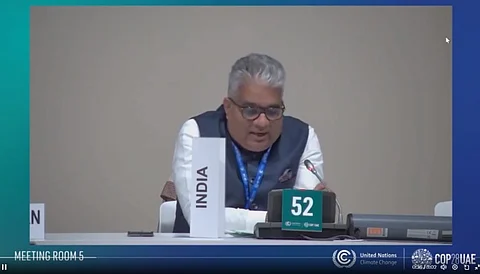

New Delhi: Calling out the ‘paltry’ resource flow for climate finance from developed countries, Minister for Environment, Forest and Climate Change Bhupender Yadav said on Friday that it is not possible for developing nations to meet climate commitments without finance. Addressing a High-Level Ministerial Dialogue on Climate Finance at the COP28, Yadav said, “The second point that I want to highlight is the relatively paltry resource flow that needs to scale up several times over through enhanced provision and mobilisation by the developed countries including through the financial mechanisms and innovative instruments that enable the mobilisation of finance by the developed countries at an affordable cost.”
“The flow of finance has to be along with access to technology such as offshore wind, battery storage… in the absence of these, it would not be possible for the developing countries to meet their commitments on the UNFCCC and the Paris Agreement,” said the minister.
“Today we are being asked many questions. The most pertinent of them all is to agree upon and ensure the minimum short-term action. In my view, the minimum short-term action that we need to prioritise and work together for is the very definition of ‘Climate Finance.’ I strongly feel that it is the most fundamental outcome we all can aim for that will automatically lay out the pathways for subsequent action towards appropriate climate financing,” said the minister.
“The lack of definition leads to a lack of trust and transparency on a matter that should be as clear as crystal,” said Yadav. Citing estimates prepared by the OECD, Yadav said that against an estimate of USD 83 billion provided for climate finance, developed countries in 2020 mobilised an amount of USD 21 to 24.5 billion only. “The definition of climate finance that takes into account climate specificity, new and additional flows and grant-based and resources at highly concessional terms is imperative,” he said.
“Biennial communication under Article 9.5 of climate finance flows under Article 9 of the Paris Agreement should be based on mutually agreed standard formats with sufficient disaggregation of the type of finance flow and what it may be meant for to allow information to be consistent, predictable, and transparent,” said the minister.
“While we recognise the questions put to us to answer, it is imperative that we now move towards solution mode with options for us to deliberate upon. We hope that my suggestions are considered for inclusion in the next dialogues. We have to act together to address the challenge of climate change,” he added.
